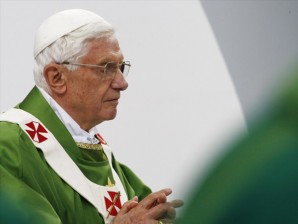
Pope Benedict XVI celebrates a mass at the Olympic Stadium in Berlin, Germany, Thursday, Sept. 22, 2011. Pope Benedict XVI is on a four-day official visit to his homeland Germany. (AP Photo/Andrew Medichini)
BERLIN—Pope Benedict XVI expressed understanding Thursday for those who had turned their backs on the Catholic Church after the recent sex abuse scandals, on his first state visit to his German homeland.
At the start of a four-day trip, the pontiff also took a conciliatory tone with thousands of protesters rallying in free-wheeling, increasingly secular Berlin and reached out in the former Nazi capital to the Jewish community.
“I can understand that in the face of such reports, people, especially those close to victims, would say ‘this isn’t my Church anymore’,” the pope, 84, told reporters on his plane from Rome in reference to widespread abuse by priests.
But he asked for patience as the Church grapples with enduring outrage over the scandals that has threatened to cloud his visit to Germany, where his election six years ago had met with an outpouring of joy.
The Church “is a net of the Lord which catches both good fish and bad,” he said ahead of his arrival, which was met with a 21-gun salute and children bearing flowers under glorious autumn sunshine.
He said in his first speech to a national assembly, Germany’s Bundestag lower house of parliament, that public officials must embrace their moral responsibilities.
“To serve right and fight against the dominion of wrong is and remains the fundamental task of the politician,” he said in an address that met with a standing ovation as well as a boycott by dozens of leftist lawmakers.
The pope said growing positivism, the rule of logic and the rejection of metaphysics, was diminishing humanity and encouraging “extremist and radical movements” to fill a vacuum left in Western culture.
A few blocks away behind police barriers, peaceful demonstrators, some dressed as condoms and nuns, rallied against Benedict’s views on issues ranging from gay rights to the paedophile priest scandals.
Police and protesters put their number at around 10,000, half the number organisers had expected.
Benedict told reporters demonstrations were “normal in a free society marked by strong secularism.”
“One can’t object” to such protests as long as they were “civil”, he added. “I respect those who speak out.”
Critics say the pope is out of touch with modern life with his rigorous dogma on artificial contraception, homosexuality and the role of women.
Benedict’s papacy has also been marred by the revelations in Germany last year of rampant abuse by priests over several decades, which helped drive more than 181,000 from the Church — 57,000 more than in 2009.
The Vatican has indicated it is likely the pontiff will meet with victims, as he has on previous trips.
However the head of a prominent abuse victims’ association, Matthias Katsch of Eckiger Tisch, said the Church must do more to rebuild the trust of those who suffered at the hands of its clergy.
“I personally did not leave the Church because I am convinced that change is possible,” the 48-year-old, who says he was molested while attending an elite Catholic school in Berlin, told AFP.
“But if you have lost hope then you must leave to demonstrate to the Church that it is on the wrong path.”
Chancellor Angela Merkel, the daughter of a Lutheran pastor, said she and the pope had spoken about the current financial market turmoil and “the fact that politicians need the power to lead for the people rather than be led, which is a very, very difficult task in the current period of globalisation.”
The pontiff later met with the leader of Germany’s Jewish community, Dieter Graumann, and said he was convinced that “trust has grown between the Jewish people and the Catholic Church.”
Capping an action-packed first day, Benedict celebrated an open-air mass before a cheering crowd of some 70,000 at the historic Olympic Stadium.
The leader of the world’s 1.2 billion Catholics has a gruelling schedule, with 18 sermons and speeches during his 21st trip abroad.
It is his third to Germany as pope following World Youth Day in Cologne in 2005 and a private visit to his native Bavaria in 2006.
Further stops include Erfurt in former communist East Germany and predominantly Catholic Freiburg in the southwest.
But polls show an overwhelming majority of Germans are largely indifferent to “their” pope’s visit.
Germany’s Christians are split down the middle between Catholics and Lutherans, each with about one-third of the population in the country that was the cradle of the Protestant Reformation 500 years ago.
Originally posted: 5:23 pm | Thursday, September 22nd, 2011

